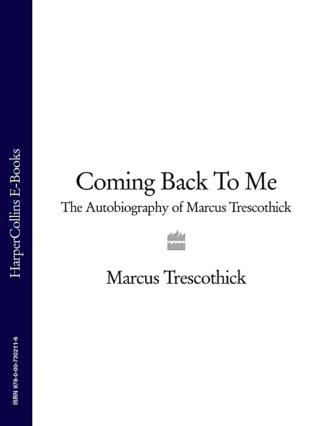
Полная версия
Coming Back To Me: The Autobiography of Marcus Trescothick
Then the batsman’s nightmare. My sister was to-ing and fro-ing at home so we arrived late for the start of the match. All I had been thinking about was getting in early enough to give myself the best chance of making the required number of runs. But, when we arrived late and I was told we had won the toss and were already batting, that meant less chance for me. And what if the openers never got out?
Eventually I went in, but time was running out. The tension built up because everyone there knew what was at stake, and, with one ball to go in our innings I still needed two runs. I got a bottom edge on a decent yorker and groaned inwardly as the keeper parried it. I set off for the other end knowing I might be able to run a single but unless something extraordinary happened there was no way I would get two. Then, something extraordinary did happen.
Their keeper threw the ball at the stumps to try and run out my partner; he was in by miles when the ball hit the stumps and ricocheted off into the covers and I was able to scramble back for the second. I remember walking off the pitch bawling my eyes out.
And 4,000 seemed to be the magic number. Soon afterwards The Cricketer Magazine told me I had won their award for the outstanding young cricketer of the year. I duly pitched up at Lord’s to receive my award and a load of kit from Mickey Stewart, the England senior coach, Angus Fraser and Carl Hooper, who had been opponents in that summer’s Test series, and the radio commentator Brian Johnston. When he watched me in the indoor school nets at Lord’s that day Mickey made a point of querying why I hadn’t been picked for the Under-15s, and soon afterwards he made sure I was awarded a place on the MCC School of Merit training scheme there, for which I travelled up to London once a week throughout the winter, which was a wonderful consolation.
Brian Johnston’s behaviour that day was magnificently eccentric. Johnners had an absolute obsession about the Australian soap opera Neighbours. Wherever he was, if Neighbours was on the telly he had to watch it. Everything stopped for Ramsay Street. And there and then, as we were settling down to a buffet reception after the awards had been completed, Johnners set up a portable TV in the corner of the room and switched it on for his daily dose of Kylie, Jason and Madge.
After all that, then scoring heavily for Somerset Under-19s, including an unbeaten 158 against Warwickshire, followed by a 2nd XI appearance, sitting my GCSEs in the summer of 1992 seemed somewhat beside the point. Bob Cottam, the Director of Cricket at Somerset, and Peter Robinson, the coach had already indicated they would be interested in signing me. The headmaster at Sir Bernard Lovell recommended I should turn them down and go back for A-levels, but, as I’d managed the sum total of one pass in my GCSEs, a ‘B’, in Drama, I can only think he must have spotted something in me no one else had done thus far. I told him, politely, that I could get an education at any age but I would only get one chance at cricket. There was talk of me enrolling at Bath Technical College to do a sports training course or some such, but when it became clear the only thing I wanted to do for a living was play cricket, mum sat me down and said: ‘Right, well, if you’re going to play cricket, do it properly. That means you’ve got to knuckle down and train and do everything you have to.’
Just before the end of my academic career I received news that I had been selected for the England Under-17s, to play three Tests against South Africa in July and August, and, only a few days after I left school, aged 16 and a half, dad received a hand-written letter from the Somerset secretary Peter Anderson, confirming that they wanted me to join them, as of 17 August, on a contract that would see me through until 1994.
‘The salary level is in line with that of other junior players,’ he wrote.
‘There is a minimum wage agreement but that does not come into force until a player has two years’ service. I think that with accommodation paid for plus allowances on match days, it is not too bad for youngsters. However, should you wish to discuss this or any other matter, please give me a ring.
‘We are very happy that Marcus wishes to join us. He will have a lot to do and learn, of course, but at least he now has a chance to realize his ambition.’
I can’t actually remember how much they offered me to start off with. I’ve got a vague recollection of £100 per week plus accommodation. Then £3,000 for 1993 and £3,300 for ’94. It sounded and felt like a king’s ransom.
In any case, I would have paid them.
Конец ознакомительного фрагмента.
Текст предоставлен ООО «ЛитРес».
Прочитайте эту книгу целиком, купив полную легальную версию на ЛитРес.
Безопасно оплатить книгу можно банковской картой Visa, MasterCard, Maestro, со счета мобильного телефона, с платежного терминала, в салоне МТС или Связной, через PayPal, WebMoney, Яндекс.Деньги, QIWI Кошелек, бонусными картами или другим удобным Вам способом.


